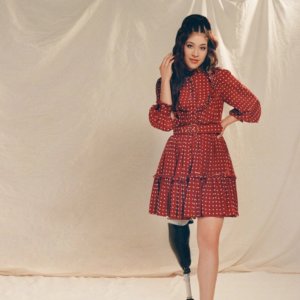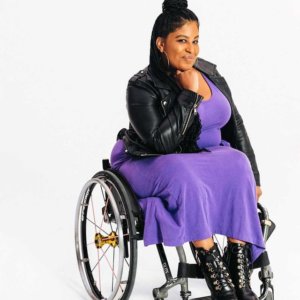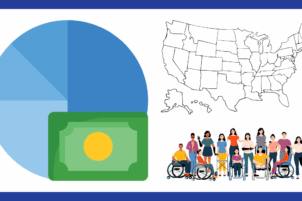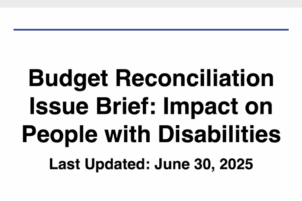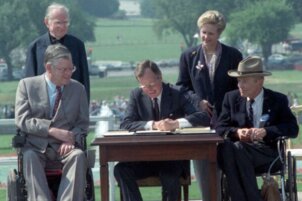Los Angeles, Nov. 24 – November is Native American Heritage Month, or as it is commonly referred to, American Indian and Alaska Native Heritage Month. It is important to celebrate rich and diverse cultures, traditions, and histories and to acknowledge the important contributions of Native people, including those who also are members of the disability community.
Actress Alaqua Cox exemplifies this intersection. Marvel Studios’ latest episodic series Hawkeye premiered November 24 on Disney+, featuring Cox as Maya Lopez, who is the second deaf character in the Marvel Cinematic Universe. In addition to being deaf and an amputee, Cox is Native American (Menominee and Mohican Nation).
“I believe kids deserve to see inclusivity and accurate representation,” Cox said in an interview with The Hollywood Reporter. “It will make kids with all types of cultures and disabilities feel like our dreams can break free from limitations.”
RespectAbility’s Senior Entertainment Media Associate Tatiana Lee, who is a disabled woman of color with Native American heritage who also is an actress, international model and activist, pursued a career in the entertainment industry because she did not see herself reflected on screen. At RespectAbility, Lee is the lead consultant on various TV and film projects and conducts training for studios and production companies including NBCUniversal, Netflix, and The Walt Disney Company, and assists with RespectAbility’s Lab for Entertainment Professionals with Disabilities.
“I went through many struggles of sense of self and identity because I didn’t see myself represented,” Lee said. “You feel like an outcast, a unicorn, but sometimes not always in a good way. I try to embrace the unicorn thing, but other times it feels isolating.”
Cox’s role will make a difference for the next generation of children.
“Although a first-time actress, she is an absolute force of nature on the screen,” said RespectAbility Vice Chair Delbert Whetter, who has been working with Marvel Studios over the past couple of years to advance the representation and inclusion of people with disabilities both in front of and behind the camera. “In my mind, Hawkeye is proof positive of the immense value that ones’ uniqueness offers to a creative industry like Hollywood.”
To celebrate this month, Lee sat down with RespectAbility Communications Apprentice Mary McGill Lucas to share more about how her intersectional identities as a disabled woman of color with Native American heritage have shaped her experiences while navigating the entertainment industry and activism spaces:
Q: What was your experience growing up in Coatesville, Pennsylvania?
Lee: It is a relatively small city within Amish country, so there were specific points where I was the only person of color and disabled. I didn’t think about experiencing racism because my disability is so visible, and I was so young that I didn’t know if there were certain moments where I was discriminated against for both. But I will tell you one moment where I think I was, and it was both at once. In high school, during 10th grade, I was forced to drop out because my school didn’t know how to support me. But another person was a wheelchair user who went to school with me, who was white and had a two-parent home. They never forced them to drop out, and they graduated with our class; I didn’t. So, when I look back at moments like that, I realize there were moments where my circumstances of being black and growing up in a single-family home, I was discriminated against.
Q: Growing up, how did you navigate not feeling seen in mainstream media?
Lee: I went through many struggles of sense of self and identity because I didn’t see myself represented. You feel like an outcast, a unicorn, but sometimes not always in a good way. I try to embrace the unicorn thing, but other times it feels isolating. This is why I do the work that I do now. Not seeing myself represented affected me so much. In any and everything, the way I was treated growing up, from reactions that people had of me on the street to how I was treated in school to friendships, impacted every aspect of my life and led me to deal with depression and many other things. The best example I can think of is sitting in a football game, and you’re benched, but everyone else is playing on the team; that’s what it feels like.
Q: How have you navigated having a disability and not having a college education in the entertainment industry?
Lee: I did go to college; I didn’t finish. I took the GED and scored high enough to get a diploma. Some of my friends that were good at math helped me. I have dyscalculia, so math and numbers are tricky. After I was accepted to Community College, I loved the business and communications courses. However, after taking and failing multiple math classes, I gave up. It was very triggering for me because I had to take geometry three times in middle school before I passed. Navigating the industry has been exciting. I think where I am now; I got a unique start because I started as an influencer.
I started out doing what I wanted to do on my social media, started my blog, and started writing and telling the stories I wanted to tell. I just wanted to talk about navigating events as a wheelchair-user and trying to meet people to network in L.A. because I wanted to model and act, but no one would hire me. So, I started taking my photos, which is what got my foot in the door of just finding my niche and who I was. I knew I was good at storytelling, and I knew I was good at taking photos because as a kid, all I ever wanted to do was modeling. I studied modeling; I’ve watched every episode of America’s Next Top Model and Project Runway. But I take modeling very seriously, and it was something that I knew I could do. I was good at it, so I think I used my storytelling and my ability to be an excellent model to my advantage. That opened doors for me. From there, I started getting noticed by brands, and brands would hire me. My very first modeling job was modeling for Apple. Since then, I’ve got to model for Zappos and Target, and more, and I recently did a photo collaboration with Tommy Hilfiger. These opportunities led to acting opportunities and gave me an insight into where there are gaps in the industry and where the industry falls short.
Q: How has your identity as Native American and a woman of color affected how you view and navigate your disability?
Lee: It has taken a toll on my identity as disabled because I think there’s more stigma about disability within black and brown communities. It’s almost like you feel you don’t quite have space to fit in because you go into disabled spaces; they are often predominantly white, so they don’t fully understand your experience of being BIPOC. Then you go into black and brown spaces and experience their misconceptions about disabilities that are put onto them by white supremacy. It’s not my family’s fault or the people from the black and brown community’s fault. It’s what’s been distilled in us.
There is an idea that you can’t do certain things. You have to sit in a particular place, and people take care of us because they assume that you can’t do something because of your disability. Society teaches us to feel bad for and pity disabled individuals. People underestimate you, even your own family. I find myself proving myself and other people wrong, reaffirming what I can do as a disabled individual. Everything and everyone, from my family to the outside world, continues to challenge me. But, I’m at the point in my life where I don’t need to prove anyone wrong. I’ve built up a muscle of continuously proving myself wrong, and now I can tell people that I got this and to move out of my way.
Q: Is there anything else you want to add about your identity as indigenous and a Native American?
Lee: I want to say that my indigenous culture is vibrant for me through my grandfather. My grandfather grew up on a native land reservation of Haliwa Saponi, a tribe in North Carolina. Every year, my grandfather would take my family and me to the reservation for Pow Wow, and it’s such a rich culture. This experience shaped how I see pride. In our American culture as a whole, we’ve been taught to fit into a European-dominated culture. But this culture helped instill a sense of pride in being a descendant of the original people. I am a true American because I am Indigenous, Black, and European. So, I am the true definition of an American based on what started here, and I’m an embodiment of all of that. I’ve learned to take a sense of pride in that.
Q: How do you navigate using social media for activism and people viewing it as performative?
Lee: I think that’s why accessibility is something that I love geeking out about. In my world, you can’t have one without the other. I believe within my activism of entertainment, also advocating for accessibility and bringing awareness to this topic. Digital activism (or ‘Slacktivism’ as some people call it) is just as crucial as marches and policy work. Digital activism brings awareness to create change, creating and engaging in conversations around accessibility and what it looks like for disabled people.
Q: What motivated you to move to L.A. to pursue your acting career?
Lee: In Pennsylvania, I couldn’t get a job because no one would hire me. It was so hard, and then my mom had moved to L.A. My mom is everything to me, and I didn’t have her; I didn’t know what to do. I needed that motherly love, so it was a combination of needing my mom and not finding a job. I knew I wanted to pursue a career in the entertainment industry. At that point, I was either going to try New York or go to L.A., and since my mom was already in L.A. I decided to come and have not looked back.
Q: Has your view on disability changed since working in entertainment and RespectAbility?
Lee: I don’t think my view on disability has necessarily changed. Since coming to L.A., I’ve made friends with other people in the entertainment industry, from influencers to content creators, to actors and athletes. Working in the entertainment industry has helped me be more aware of other people’s accessibility needs. I try to think of advocacy as supporting all disabilities. There are some people out there that only think about their disability.
One thing that has changed since working here is becoming comfortable with disclosing that I’m neurodiverse, embracing that, realizing the barriers that exist, and being honest with myself. Since working in the entertainment industry and RespectAbility, I’ve honed what is needed to be fully accessible to everyone. That is always constantly on the top of my mind. How can I make the space accessible to everyone? I know what it’s like not to be included, and I don’t want anyone to feel that way. You have to think about accessibility for other folks, whether they are disabled or not. I’m always thinking about innovative ways to expand on that, and I didn’t start thinking about that until working in the entertainment industry and realizing how the content we consume isn’t fully accessible. So, I began to think about what I could do to make that happen because so many people cannot consume traditional forms of content. For example, if they’re blind or deaf. I think that’s one thing I always ask myself: now that I’m in this position, what can I do?

